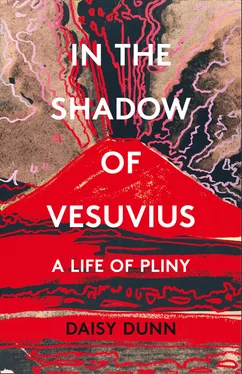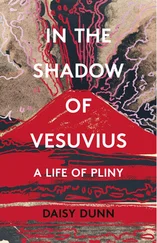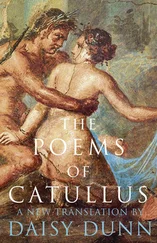1 ...8 9 10 12 13 14 ...17 It is entirely possible that the scribes made an error in copying the manuscripts and that 24 August was not the date Pliny originally recorded. 30Of all the days the volcano could have erupted, however, this was perhaps the most dramatic. In the Roman calendar, 24 August was the day after the Vulcanalia, an annual autumn festival during which worshippers constructed towering bonfires in honour of the fire god and tossed fish from the Tiber raw into its flames. Fire and water: give Vulcan what was ordinarily out of his grasp, and he might be persuaded to spare the crops for harvest season. It was a cruel and insatiable god who fanned the flames of Vesuvius just a day after receiving his feast of fish.
We may never know whether Pliny was mistaken over the date of the eruption or, more likely, there was an error in the transcription of his letters. The merest possibility that Pliny might have been wrong is surprising because he was by nature extremely meticulous. His was a logical rather than a creative mind: attuned to detail and hard fact, obedient to protocol. Where his uncle was creative, Pliny was pedantic. You can tell from his prose how much care he took in finding the right phrase to express himself. Whereas Pliny the Elder was economical with his words but prone to write in sentences which changed direction with his every thought, Pliny favoured a more methodical and measured style, which reflected his occupation and approach to life more generally.
Less than a year after the eruption, at the age of eighteen, Pliny embarked upon a career as a lawyer in the Centumviral Court. 31The centre for civil cases, the court was based within the Basilica Iulia, a beautiful multi-storeyed building in the Forum Romanum. Although it was eclipsed in Republican times by other courts, the Centumviral was now considered one of the most important in Rome. 32Its work was highly technical and required Pliny to examine disputes arising over wills and inheritance and tackle cases of fraud. Though nominally a ‘Court of One Hundred Men’, who were arranged over four tribunals, the number of jurors often by now reached 180, and there was plenty of space besides for spectators.
There were few places where oratory counted for so much, for it was the jury who cast votes to determine the verdict of each case. There was a board of ‘Ten Men’ to preside over the panels of the court, and an interested emperor could overturn a verdict if he believed that it had been unfairly influenced, but responsibility for the delivery of justice lay principally with the lawyer and jury. Pliny was elected to the presiding board but also delivered speeches for the prosecution or defence. The main principles of the law he practised dated back to the fifth century BC, and although, as a senator, he had a role in shaping new laws authorised by the emperor into decrees, the focus in his letters is rather on his speeches and the characters he encountered in the courtrooms. 33Pliny called the Centumviral Court his ‘arena’, evoking the world of blood sports. 34There was no having recourse to the kind of statutes used today. His success depended on his strength of argument and performance.
‘Risk-taker’ was not the first word anyone would have used to describe Pliny, but as an orator this was what he aspired to be. He viewed his profession as an opportunity to spread his name far and wide, and understood that his reputation depended upon what people remembered of his speeches. 35He likened the sort of rhetoric he tried to write to both the tightrope walker’s art and the helmsman’s skill for daring. Just as a tightrope walker summons gasps whenever she looks as though she may fall, so the orator who soars to a precipice and hovers on the very edge of possibility thrills the crowd, for the riskiest feats carry the richest rewards. The same is true of the helmsman. The one who sails a calm sea, said Pliny, will find no one waiting for him at harbour. But the one who puts in with his sail ropes shrieking, his mast bent, his rudder groaning, is ‘almost put on a level with the gods of the sea’. 36
The difficulty for Pliny was that the Court of One Hundred rarely attracted the most spectacular cases. Its work was necessary but, by Pliny’s own admission, very often tedious. He despaired of the ‘unknown youths’ it employed as much as he did of the applauding rent-a-crowds who received bribes for attending ‘in the middle of the basilica, as openly as if they were being given in the dining room’. 37Only occasionally did Pliny land an opportunity to thrill the masses. He was once presented with a case involving a woman named Attia Viriola, her octogenarian father, and her father’s new lover. Following a ten-day romance, the elderly man had brought home ‘a stepmother’ for Attia, whose patrimony he now sought to take away. As Pliny prepared to speak in Attia’s defence, 180 jurors and almost as many spectators arrived at the basilica and proceeded to fill its benches and galleries. Pliny was surprised to find the members of the jury as divided as they were, some wholly sympathetic to the daughter, others unable to conceal their admiration for her spry father. But then he delivered his speech which, by his own account, was as intricately crafted as the armour that Vulcan forged for Aeneas in Virgil’s epic. With an eye to capturing the vividness of the poet, Pliny had composed a long speech ‘sustained by the amount of material, and its expressive structure, and the many little flights of narrative, and the variety of the style’. 38It was a triumph. The case was settled in favour of the daughter.
For all its shortcomings, the Court of One Hundred offered Pliny a valuable arena in which to rehearse his most daring oratorical leaps. He modelled himself on not only Virgil but the greatest orators of history: Demosthenes, Cicero, and Calvus. Demosthenes had been a politician and formidable orator in fourth-century BC Athens and established himself as the master of the comprehensive but perfectly structured argument. Calvus had flourished as both an orator and a poet in Catullus’ set in the first century BC and impressed Pliny with the sheer force of his words. For ‘rhetorical flourishes’, meanwhile, Pliny turned to Cicero. 39
When Pliny wasn’t mining the orators’ texts for inspiration, he was looking to the weather. Snow was best. ‘Driven and continuous and plentiful, divinely inspired and heavenly,’ it seemed to offer itself up as a model for the daring speech-writer. 40First came the blizzard, the storm of words. Then the let-up in the spate that allowed the finest phrases to melt into a jury’s ears. Finally, ice might be extracted from the slush and driven into them ‘like a sword at the body – for so a speech is impressed upon the mind by equal thrust and pause’. 41Snow may be incessant, but it is too varied in its consistency to be monotonous. Just as no one can stem snowfall, so Pliny believed no one ought to limit an orator or cut him short mid-flow.
He liked to remember how Odysseus stood as stiff as a skittle in the Iliad, but when he ‘spoke from his big chest his words were like the snowflakes of winter, and no other mortal could then rival Odysseus’. 42Such was the power of his words that they also turned those who heard them into melting snow. On returning home to Ithaca, as Pliny knew, Odysseus came before his wife Penelope in the disguise of a beggar and told her a false story that made her weep in remembrance for the husband she thought was lost to her:
As she listened her tears fell and her complexion melted.
Just as snow melts away on mountain peaks when the
West Wind pours it down and the South-East Wind melts it
And as it melts the rivers swell and flow,
So tears snowed down and melted her beautiful cheeks
As she wept for the man who was at her side. 43
Читать дальше












